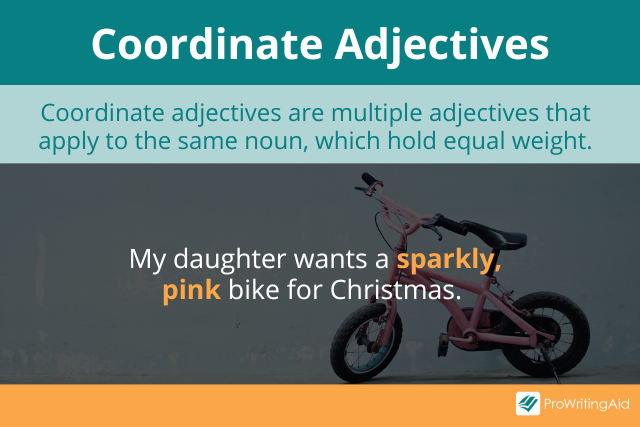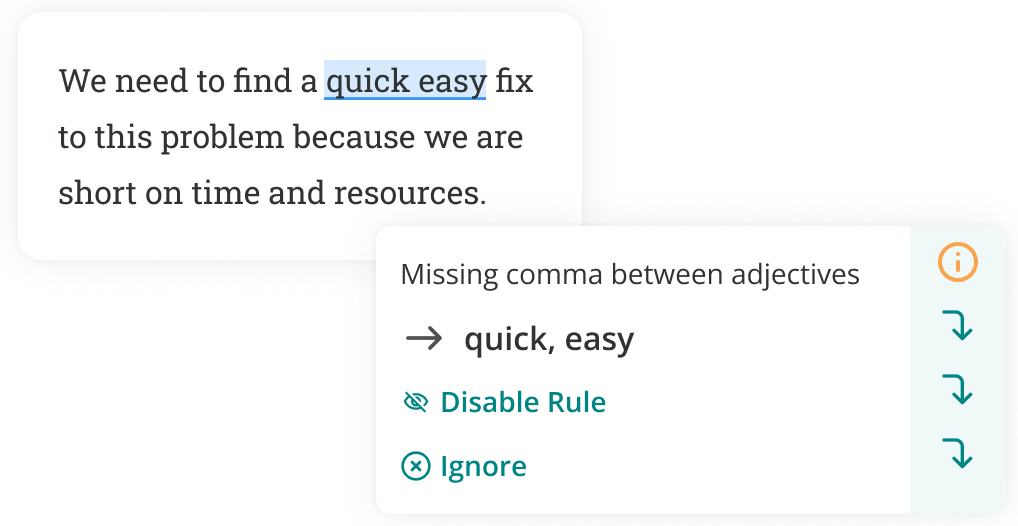
If you want to become a better writer, you’ll need to understand English grammar and how to wield it effectively.
One grammatical term you might have come across is the term coordinate adjective. So what exactly does this term mean?
Coordinate adjectives are words used in sequence to modify the same noun, which hold equal weight within the sentence.
This article will give you a detailed guide to coordinate adjectives and teach you how to use them in a sentence.
What Are Coordinate Adjectives?
Coordinate adjectives are two or more adjectives that apply to the same noun. They modify the noun equally, so it doesn’t matter which adjective comes first in the sentence.
Unlike other adjectives, coordinate adjectives should always be separated by a comma.
You can tell that adjectives are coordinate adjectives if they pass two tests. The first test is to change the order in which the adjectives appear. The second test is to replace the comma between the adjectives with the word and.
If you can do both these things without changing the meaning of the sentence, then you know for sure that you’re working with coordinate adjectives.

For example, consider this sentence:
- I got married on a beautiful, sunny day.
The two coordinate adjectives beautiful and sunny both modify the noun day. They have equal importance in the sentence, which makes them coordinate adjectives.
Just to double-check, let’s see if this sentence passes our two tests for coordinate adjectives.
You can replace the comma with and, and the sentence still makes sense:
- I got married on a beautiful and sunny day.
Also, the sentence makes sense if you change the order of the coordinate adjectives:
- I got married on a sunny, beautiful day.
Here are some other examples of sentences that contain coordinate adjectives:
- My dad is a gentle, patient man.
- That speech was rousing, motivating, and inspirational.
- This delicious, aromatic dish is really making my mouth water.
Coordinate vs Cumulative Adjectives
Unlike coordinate adjectives, cumulative adjectives modify the noun in a specific order that can’t be rearranged. You don’t need to separate cumulative adjectives with a comma.
Cumulative adjectives are also called hierarchical adjectives because they exist in hierarchy. In other words, they’re not all equally important within the sentence.
For example, consider this sentence:
- My sister bought a bright green jacket at the store yesterday.
In this example, bright modifies green while green modifies jacket. The words bright and green are not modifying the same noun, so they’re not coordinate adjectives.
If you tried to switch the order of the adjectives, the sentence would no longer make sense:
- My sister bought a green bright jacket at the store yesterday.
You also can’t replace the comma with and:
- My sister bought a bright and green jacket at the store yesterday.
In English, there’s a specific order for cumulative adjectives to appear in a sentence:
- Quantity (e.g. two, many)
- Opinion (e.g. fun, boring)
- Size (e.g. large, tiny)
- Age (e.g. young, mature)
- Shape (e.g. round, bent)
- Color (e.g. green, purple)
- Proper adjectives (e.g. Japanese, Christian)
- Material (e.g. cotton, silk)
- Purpose (e.g. sleeping bag, aerobic workout)
If you break that order, the sentence will sound strange. For example, you would always say that someone has “three large cats,” not “large three cats.” That’s because three modifies large cats, and large modifies cats.
Here are some more examples of cumulative adjectives:
- She went to the gym for a strenuous aerobic workout.
- I have two warm sleeping bags that we can use when we’re camping.
- We are students at a small Catholic school.
Coordinate Adjective Examples
Let’s look at some examples of sentences containing coordinate adjectives from popular English books.
“Sybil’s face is heart-shaped, wide at the temples, with a small, emphatic chin.”—Amity Gaige, Sea Wife
“The tense jaw’s eased, the hunched shoulders have loosened, and he’s opened up into a broad-shouldered, dozy-eyed giant of a man with a mop of messy brown hair.”—Beth O’Leary, The Switch
“It’s an untidy, mischievous laugh that refuses to go along with rules and prescriptions.”—Fredrik Backman, A Man Called Ove
“Winter came all at once that November, settling over the island in a gray and rainy pall. Naked trees shivered in the cold, clung to their blackened, dying leaves as if to let go would mean defeat.”—Kristin Hannah, Firefly Lane
“Iphigenia. A tripping name, the sound of goat hooves on rock, quick, lively, lovely.”—Madeline Miller, The Song of Achilles
“Now, the car seems like a tin skin wrapped too tight around his swollen, damp fury.”—Francis Spufford, Light Perpetual
“Jamal was like a river: calm, steady, and powerful enough to wear away mountains.”—Talia Hibbert, Take a Hint, Dani Brown
“And through it all there was a cacophony of smells and sounds: bitter herbs mingling with sweet buns; the quick, harsh Cantonese of shopkeepers making deals; the rank background stench of yesterday’s seafood.”—Malinda Lo, Last Night at the Telegraph Club
Should You Have a Comma Between Coordinate Adjectives?
You should always separate coordinate adjectives with a comma.
You can also separate them with the word and. If you have three or more coordinate adjectives, you should use and rather than a comma before the final adjective. For example, you would write, "She’s such a friendly, kind, and funny person.”
Make sure you don’t use a comma between the coordinate adjectives and the noun. It would be incorrect to write, “She’s such a friendly, kind, and funny, person.”
Conclusion on Coordinate Adjectives
There you have it—a complete guide to coordinate adjectives and how to identify them. Here’s a quick recap:
- Coordinate adjectives modify the same noun equally.
- Always separate coordinate adjectives with a comma or the word and.
- You can switch the order of coordinate adjectives, or replace the comma between them with and, without changing the meaning of the sentence.

If you’re worried about using coordinate adjectives incorrectly, don’t forget to run your work through ProWritingAid. The grammar checker will catch all grammar errors for you and give you a quick, easy fix!

